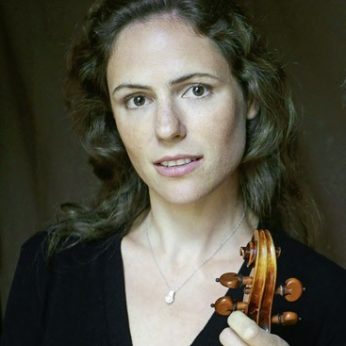Composer: Valentin Silvestrov (b. 1937)
Performance date: 01/07/2024
Venue: St. Brendan’s Church
Composition Year: 2004
Duration: 00:18:37
Recording Engineer: Gar Duffy, RTÉ
Instrumentation: vn, pf
Instrumentation Category:Duo
Artists:
Nurit Stark -
[violin]
Nicholas Rimmer -
[piano]

Five Pieces for violin and piano [2004]
1. Élégie – Andante larghetto
2. Serenade – Moderato
3. Intermezzo – Moderato
4. Barcarole – Andantino
5. Nocturne – Larghetto
The song of the world about itself, as it were a musical testimony to existence. Valentin Silvestrov
Valentin Silvestrov is Ukraine’s most renowned composer and his music has long been familiar to Bantry audiences. There was much concern for a time in March last year when he appeared to be trapped in his apartment in Kyiv until friends and family spirited him out to Berlin to wait out the war.
Silvestrov has become concerned about the survival of Music in an increasingly oppressive environment. He believes that melody provides the foundation of all his music. Poetry … is the salvation of all that is most essential, namely, melody as a holistic and indispensable organism. Either this organism is there, or it is not. I believe that Music – even if it cannot be ‘sung’ – is song nevertheless; it is neither philosophy nor a world view, it is the song of the world about itself, as it were a musical testimony to existence. This reminds us of Nietzsche’s without music life would be a mistake.
Since 2002 Silvestrov has been working with small forms for various small chamber ensembles where melody is central and creating numerous cycles, for instance this evening’s five pieces are the first instalments in a seventy-minute cycle. He describes the short pieces as bagatelles in the centre of which is the melody. He then tries to seize the melodic moment without imposing the burden of thematic elaboration or development.
Although the dynamic range is from pp to ppp with mp the loudest level, these five pieces are more forthright than much of his quiet music. The melodies are each given plenty of air without being suffocated in clouds of memory as happens in so many of his works. They are played attaca, sinking gently into each other. There is almost no other music like this that explores the gap between thinking and dreaming.
Francis Humphrys
Copyright © 2025 West Cork Music. All rights reserved.
Designed and developed by Matrix Internet